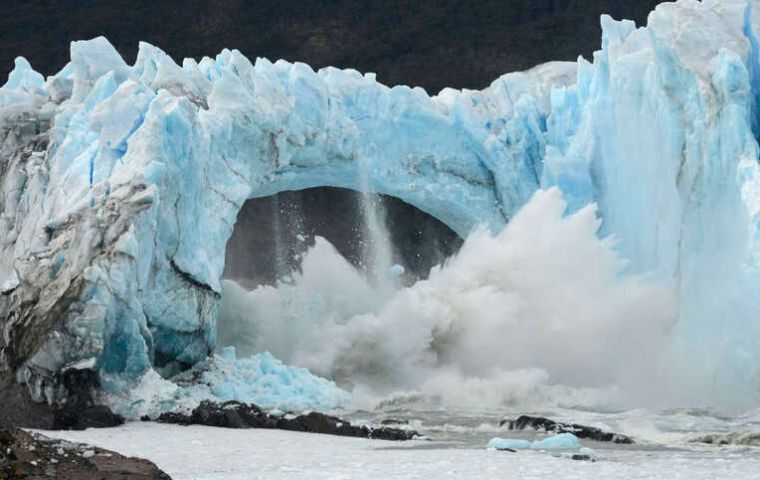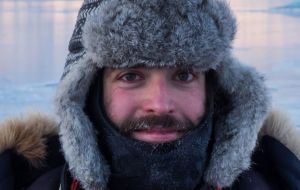MercoPress. South Atlantic News Agency
Science journal: Glaciers melting faster, sea levels on the rise
 Nearly all of the world’s glaciers are losing mass at an accelerated pace
Nearly all of the world’s glaciers are losing mass at an accelerated pace According to a study published Wednesday by the prestigious scientific journal Nature, glaciers are melting at a faster pace than previously thought, which may have serious consequences.
With the new amounts of water pouring into the sea and increasing its level by 20%, coastal cities may face changes they are not quite prepared to cope with, the study found.
Nearly all of the world’s glaciers are losing mass at an accelerated pace, according to the study, which took into account about 220,000 glaciers worldwide, a major source of sea-level rise.
Using high-resolution imagery from NASA’s Terra satellite from 2000-2019, scientists found that glaciers, except for the Greenland and Antarctic ice sheets which were excluded from the study, lost an average of 267 gigatonnes of ice per year.
A gigatonne of ice would fill New York City’s Central Park and stand 341 meters (1,119 feet) high. And Glaciers lost 227 gigatonnes of ice annually from 2000 to 2004, but that increased to an average of 298 gigatonnes each year after 2015. The melt was significantly impacting sea levels by about 0.74 millimetres a year, or 21 per cent of the overall sea-level rise observed during the period.
Glaciers tend to have a faster response to climate change compared with ice sheets in Greenland and Antarctica, and are currently contributing more to sea-level rise than either individual ice sheet, the study showed.
Robert McNabb, a researcher at Ulster University in the United Kingdom ad co-author of the study, explained that previous studies looking at individual glaciers only account for about 10 per cent of the planet.
Scientists have long warned that warming temperatures driven by climate change are eating into glaciers and ice sheets around the world, contributing to higher sea levels that threaten the world’s populous coastal cities. Global thinning rates, different than the volume of water lost, doubled in the last 20 years and “that’s enormous,” said Romain Hugonnet, a glaciologist at ETH Zurich and the University of Toulouse in France who led the study. Shrinking glaciers are a problem for millions of people who rely on seasonal glacial melt for daily water and rapid melting can cause deadly outbursts from glacial lakes in places like India, added Hugonnet.
Some glaciers in Alaska, Iceland, the Alps, the Pamir Mountains and the Himalayas were among the most impacted by melting, researchers found. “Those areas are seeing a rapid pace of glacier melt that could be fairly worrying,” McNabb said. “We get this increase in melt and that actually increases the availability of water that comes in these rivers … but the problem is, after a period of time, that stops increasing and then decreases fairly rapidly,” he added.
While the study did not delve into the cause of the glacial retreat, rising temperatures widely believed by scientists to be the result of human emissions were inevitably leading to more ice loss, McNabb elaborated. “It’s hard to separate the fact that the temperature is what is causing the melt with the fact that humans are, by and large, causing the increase in temperature,” he added.
While researchers identified instances where melt rates actually slowed between 2000 and 2019, like Greenland’s east coast, they attributed that to a weather anomaly that led to higher precipitation and lower temperatures.
McNabb said the study’s overall picture was one of “fairly rapid” ice mass loss, with no indication it would change soon, but there is still time to put the brakes on melt by reducing emissions.
Once glacial ice melts, it could take decades or centuries to regrow because it must pile up year after year, scientists said.





Top Comments
Disclaimer & comment rulesCommenting for this story is now closed.
If you have a Facebook account, become a fan and comment on our Facebook Page!